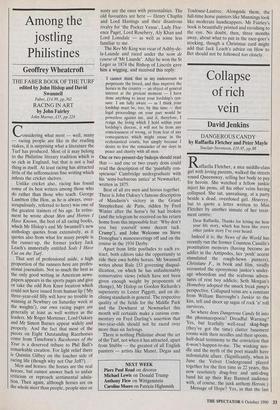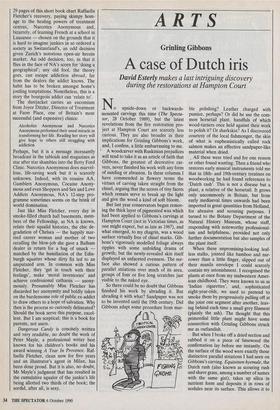Collapse of rich vein
David Jenkins
DANGEROUS CANDY by Raffaella Fletcher and Peter Mayle
Sinclair-Stevenson, £10.95, pp.88
Raffaella Fletcher, a nice middle-class girl with loving parents, walked the streets round Queensway, selling her body to pay for heroin. She watched a fellow junkie inject his penis, all his other veins having collapsed. She sat, unrealising, at a party beside a dead, overdosed girl. Heavyyy, but to quote a letter written to Miss Fletcher by another inmate of her treat- ment centre:
Dear Raffaella, Thanks for letting me hear your life story, which has been like every other junkie story I've ever heard.
Indeed it is; the News of the World has recently run the former Countess Cassilis's prostitution memoirs (having become an addict in the Antipodes, her 'posh' accent stimulated the rough-hewn punters); Christiane F., in book and film, vividly recounted the eponymous junkie's under- age whoredom and the scabrous adven- tures of rent boy addicts; Seth Morgan's Homeboy adopted the smack freak pimp's perspective. Collapsed veins are a constant from William Burroughs's Junkie to the kiss, tell and shoot up sagas of rock 'n' roll survivors.
So where does Dangerous Candy fit into the pharmacopoeia? Dreadful Warning? Yes, but fearfully well-read skag-hags (they've got the time) clutter basement rooms with their needles and their spoons, half-dead testimony to the conviction that it-won't-happen-to-me. The winking nee- dle and the myth of the poet maudit have indomitable allure. (Significantly, when in June the Velvet Underground played together for the first time in 22 years, this now resolutely drug-free and anti-drug band hit up their Ray Banned audience with, of course, the junk anthem Heroin.)
Message of Hope? Yes, in that the last 29 pages of this short book chart Raffaella Fletcher's recovery, paying skimpy hom- age to the healing powers of treatment centres, Narcotics Anonymous and, bizarrely, of learning French at a school in Lausanne — chosen on the grounds that it is hard to imagine junkies in so ordered a society as Switzerland's, an odd decision given Zurich's notorious open-air heroin market. An odd decision, too, in that it flies in the face of NA's scorn for 'doing a geographical'; any old fool, the theory goes, can escape addiction abroad, far from the dealers the addict knows. The habit has to be broken amongst home's jostling temptations. Nonetheless, this is a story the bourgeois addict can 'relate to'.
The dustjacket carries an encomium from Joyce Ditzler, Director of Treatment at Farm Place, one of Britain's most successful (and expensive) clinics:
Alcoholics Anonymous and Narcotics Anonymous performed their usual miracle in transforming her life. Reading her story will give hope to others still struggling with addiction.
Perhaps, but it is a message incessantly broadcast in the tabloids and magazines as star after star shambles into the Betty Ford Clinic. Narcotics Anonymous does marvel- lous, life-saving work but it is scarcely unknown. Indeed, with its cousins AA, Gamblers Anonymous, Cocaine Anony- mous and even Shoppers and Sex and Love Addicts Anonymous, NA's 12-step pro- gramme sometimes seems on the brink of world domination.
Just like Miss Fletcher, every day in smoke-filled church hall basements, mem- bers of the Fellowship, as NA is known, relate their squalid histories, the chic de- gradation of Chelsea — the happily mar- ried career woman and mother of two recalling the blow-job she gave a Balham dealer in return for a bag of smack — matched by the humiliation of the Edin- burgh squatter whose dirty fix led to an amputated arm. In common with Miss Fletcher, they 'get in touch with their feelings', make 'moral inventories' and achieve confessional catharsis — anony- mously. Presumably Miss Fletcher has discarded her anonymity and boldly taken on the burdensome role of public ex-addict to draw others to a hope of salvation. Why then is the process so curiously delineated? Should the book serve this purpose, excel- lent. But I am sceptical; this is a book for parents, not users.
Dangerous Candy is concisely written and very readable, no doubt the work of Peter Mayle, a professional writer best known for his children's books and his award winning A Year In Provence. Raf- faella Fletcher, clean now for five years and an illustrator's agent in Milan, has been done proud. But it is also, no doubt, Mr Mayle's judgment that has resulted in the cumulative squalor of the junkie's life being allotted two thirds of the book; the sordid, after all, is sexy.



















































 Previous page
Previous page